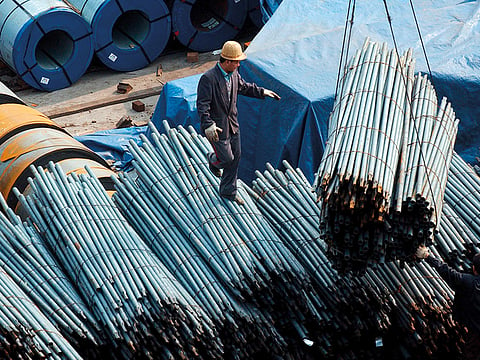Commerce Secretary Ross’ former firm investing in Chinese steel
Along with China Baowu Steel Group and a few other firms, WL Ross is setting up an investment vehicle

Washington: Wilbur Ross’ former investment company is making a big bet on China’s steel industry, even as the billionaire works to finish severing ties to the firm and his Commerce Department challenges alleged dumping of Chinese steel.
WL Ross & Co, founded by Ross and later acquired by Invesco Ltd., said Saturday that it will help lead a joint venture to acquire steel assets in China. Along with China Baowu Steel Group and a few other firms, WL Ross is setting up an investment vehicle — Four Rivers Investment Management Co — to find underperforming assets with plans to invest between $5.8 billion and $11.6 billion (Dh21.3 billion and Dh42.5 billion) from its Shanghai headquarters.
The announcement came the day after a summit between President Donald Trump and his Chinese counterpart Xi Jinping. After the talks, Ross said the countries agreed to a “100-day plan” to discuss trade. He said the most noteworthy development from the two-day talks was the Chinese delegation’s “interest in reducing their net trade balance.”
It’s unclear to what extent Ross — just 40 days into his job running Trump’s Commerce Department — was briefed on the negotiations for the Four Rivers arrangement before he left his firm, but he “had nothing to do with this” effort, said Jeaneen Terrio, a spokeswoman for WL Ross. She said the deal was initiated by Stephen Toy, senior managing director and co-head of the firm. Terrio said the timing of the announcement wasn’t meant to coincide with Trump’s diplomatic meetings.
No linkage
“There is no linkage between this joint venture and any discussions between Secretary Ross and Chinese government officials this week,” said James Rockas, a spokesman for the Commerce Department, who added that Ross had no inside knowledge of the deal. “He is not a participant in this joint venture.” Four Rivers’ chairman will be Ma Weihua, former chief executive of China Merchants Bank Co., whose parent company is involved in this new fund. The other partners include Hwabao Investment Corp. and US-China Green Fund.
“China clearly represents the fulcrum of the steelmaking industry,” Toy said in a statement. He said having the joint effort “anchored” by steel giant Baowu will be an advantage.
Ross, 79, was chosen by Trump to run Commerce in November and was confirmed February 27. He made much of his fortune acquiring, restructuring and reselling ailing US Steel mills before passing the management of his namesake private-equity firm to others in 2014, while remaining chairman and chief strategist until joining the government.
Shedding shares
When he joined the Trump administration, Ross resigned from dozens of business roles, including at WL Ross, though he planned to retain interest in certain existing private-equity funds with the understanding that he wouldn’t get involved in decisions that might affect them. In an ethics disclosure, he also outlined a plan in which he would shed Invesco shares within 210 days. Rockas said Ross is still divesting, and Terrio said she couldn’t confirm how far that process had progressed.
Federal ethics rules require administration officials such as Ross to disclose stock sales within 30 days. No such disclosures have appeared on Ross’ Invesco stake.
Most protectionist
Before he was confirmed, Ross told US lawmakers that China is the most protectionist of the largest major economies, and he said he would work to level the playing field with China on trade — particularly in reducing the overcapacity of its steel industry.
The New York Times reported on Thursday that Trump plans to soon sign an executive order targeting countries, notably China, that sell steel in the US market at below cost prices.
Trump signed a memorandum on January 24, days after taking office, directing the Commerce Department to develop a plan under which new oil pipelines in the US would be built using American-produced materials, in particular steel or iron, to the largest extent possible.
US Steel companies have complained for decades about the alleged dumping of steel by China and other countries, with mixed results. Most recently, in February, the Commerce Department announced anti-dumping duties against certain types of Chinese steel.
Sign up for the Daily Briefing
Get the latest news and updates straight to your inbox



